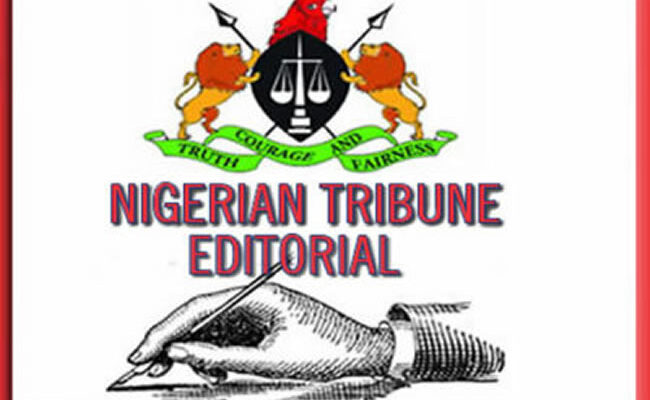RECENTLY, members of the Joint Union Congress of the Police Service Commission (PSC) called on President Bola Tinubu to sack the Inspector-General of Police, Mr. Kayode Egbetokun, over his alleged meddlesomeness in the recent recruitment of police constables. The call came amid the controversy between the IGP and the PSC, which recently released the names of the 10,000 successful candidates at the recent recruitment exercise it undertook. Speaking during a press briefing in Abuja, the union also alleged that some top officers within the Nigeria Police Force (NPF) had tried to smuggle names into the list of recruits The union described the reactions of the NPF as mere diversionary tactics, accusing it of trying to prevent the president from noticing the unpreparedness of the police training schools to handle the training of the recruits, owing to the sorry state of the facilities. The allegations were made after the IGP alleged that the recruitment process was characterised by corruption and other irregularities and therefore rejected the outcome.
Egbetokun had said: “Upon careful scrutiny of the list released on the PSC portal, it was discovered that several names of persons purported to be names of successful candidates are those who did not even apply and therefore did not take part in the recruitment exercise. The published list contains several names of candidates who failed either the Computer Based Test (CBT) or the physical screening exercise or both. There are those who made it to the last stage of the exercise but were disqualified, having been found medically unfit through the standardised medical test, but who also made the list of successful candidates as published by the PSC. Most worrisome is the allegation of financial dealings and corrupt practices leading to the outcome where unqualified and untrainable individuals have been shortlisted.”
It is a shame that the IGP and the PSC are taking the familiar path of mutual hostility once again. Over the years, IGPs have treated the PSC with utter contempt and attempted to take over its roles in police recruitment. The IGPs, who should have been sent packing for their flagrant violation of the law, retained their jobs even as they heated up the polity with their belligerence. On the other hand, the PSC, the agency whose statutory roles the IGPs tried to usurp, was never above board in the discharge of its duties. That is why over the years, we have had to protest the extremely shameful manner in which both parties carried on. For instance, in August 2019, the PSC claimed that it could not verify the academic credentials of 80,724 applicants shortlisted for employment into the constable cadre in the NPF, adding that the candidates were shortlisted based on their physical attributes, and that verification of their certificates would be done by the West African Examinations Council (WAEC) after their admission into police colleges.

As we noted then, getting the examination bodies to verify the submitted credentials ever before any form of training or screening should not be difficult for the PSC, as they are public institutions and ought to have been taken into confidence by the PSC in vetting credentials. In December 2020, we deplored the PSC’s submission that 925 names had been smuggled into the list of recruits during the effort by the government to inject 10,000 new constables into the force. At the time, the PSC had claimed that the constables that it properly recruited had been screened, given appointment letters, captured into the Integrated Pay-Roll and Personnel Information System (IPPIS) for the payment of their salaries and allowances, but that it had still bent “backwards to accommodate those on the controverted list that neither applied for the job nor went through screening, aptitude test and medical examination,” hinging its action on what it described as the “overall interest of the nation, as state resources had been expended on them and the beneficiaries exposed to weapons and weaponry.”
At the time, we lamented that neither the commission nor any other appropriate authorities had initiated punitive actions against those behind the fraudulent act, thus raising the question of disregard for due process and the sanctity of rules and regulations in the conduct of public affairs. As we noted, an important exercise like the recruitment of police personnel had been turned into yet another stage performance for sacred cows. We added that the irregularities were sufficient to instill fear and anxiety in the populace, and that the society was imperiled if the flagrant disregard for due process was not immediately addressed, saying that the PSC’s so-called “national interest” legitimized crime and criminals through unholy accommodation. Sadly, it is the same story all over again.
Police recruitment is an assignment that should be handled with diligence and with dispatch, particularly given the security challenges facing the country. But that has hardly ever been the case: the IGP and the PSC exchange brickbats, undermining the process. In the current case, it is sad that IGP Egbetokun is continuing the script written by his predecessors while the PSC itself struggles to inspire public confidence. To cite one example of his predecessors’ action: while commenting on the planned recruitment of 40,000 community police officers announced by the then IGP, Mohammed Adamu, in August 2019, the PSC spokesman, Ikechukwu Ani, said the commission was not part of the initiative. The IGP and the police hierarchy knew the law, but chose to scoff at it. Again, we state that the job of recruiting police personnel is that of the PSC, and IGPs should stop resisting this fact. The mandate of the PSC is clear and unambiguous: it spells out the relationship between the police and the commission. In that regard, it is objectionable for one to undermine the other. On the other hand, the PSC must note that the awful perception of the force occasioned by the bad conduct of certain elements within it derives from faulty, error-strewn recruitment. It must clean up its act and inspire public confidence.

It is a shameful reflection of the tardiness surrounding the running of government and society in Nigeria that every recruitment exercise into the NPF, an otherwise simple exercise delineated in the statute books and unambiguous regarding who should be in charge and how it should be monitored, is enmeshed in crisis and unfathomable allegations by different layers of police authorities. Why should it be difficult for a law-enforcing organisation like the police to follow the rules? And why should every recruitment exercise be marred by corruption? There is an obvious need to get to the bottom of the shenanigans accompanying recruitment exercises into the NPF. The government must fish out the corrupt influences if the country is to be saved from the recurrent embarrassment associated with recruitment exercises. Enough of the endless bickering.

Read Also: N100 NIN Slip Purchase: Bosun Tijani unveils proactive measures amid data breach concerns








